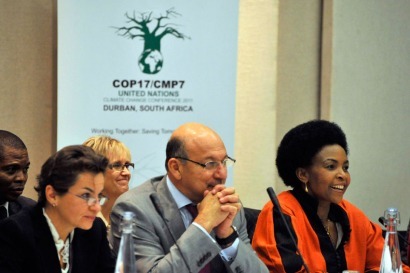
The seventeenth Conference of Parties (COP17) is fast approaching, scheduled to take place in Durban from 28 November - 9 December 2011, it is being deemed to be one of the most politically diverse and broad-ranging events within the climate change calendar.
The Hosts
The South African government faces the challenge of addressing national priorities whilst interacting with the global nations; being transparent, fair and equal within the negotiation process. This challenge becomes clear when looking at how, on a socio-economic level - South Africa has witnessed an increasing divide between rich and poor. Coupled with the growing demand for energy – the government has given priority to developing the country’s ability to produce its own electricity, which has a continued emphasis on fossil fuels.
South Africa is in fact the world's 16th most ‘electricity-intensive’ economy, which arises mostly as a result of 70% of their primary energy and more than 90% of their electricity coming from coal. South Africa has been labeled as being a country that provides too much emphasis on fossil fuels and as the host nation of COP17; the spotlight will be upon them.
The South African Government have made moves towards harnessing the potential for renewable energy and have signed a work plan with the International Energy Agency (IEA) that will see the country step closer to realising its objectives on cleaner energy. They have also; more recently announced a R150 billion, 5 000-MW solar park to be built in the Northern Cape. However, with the government’s objectives of 24% emission reductions by 2020 and 42% by 2025, questions are being raised as to whether the extent of South Africa’s commitment to climate change is sufficient.
After Kyoto
One of the big questions about the potential outcomes of COP17 is the future of the Kyoto Protocol. The Kyoto Protocol is the only legal framework that calls for emission cuts by developed countries and the first commitment period expires in December 2012. The agreement of a second period of agreement is seen as a pivotal to the success of the Durban conference. Alternatives include the establishment of the “Copenhagen Accord.” this is the Accord that was initiated in COP15 in Copenhagen and favoured by the US, which supports a voluntary “pledge and review” system for all countries that are high emitters. Or, a new comprehensive legally-binding framework could be enforced. This is the favourite of the EU and would engage all parties and especially major economies in taking on necessary commitments and actions. This could actually be the best option, as some may say that Kyoto has failed to deliver as the US failed ratify the agreement, plus India and China were exempt from the treaty.
So what recruitment trends could we see develop post COP17?
Overall the message for corporations worldwide is that there are new green opportunities, these include: leveraging green finance, investing in renewable energy and environmental design; combined with a new sustainable marketplace – companies that become aware of these and utilise strategic opportunity will obtain a competitive advantage and according to Duane Newman, Director: Sustainability and Climate Change, Deloitte “Businesses that ignore environmental issues do so at their own peril”.
The experience of Allen & York, specialist International Sustainability Recruiters is that there is significant job growth within; Renewable Energy, Energy & Carbon Management and Water Management. As businesses become more aware of the effects of climate change, there will be even more pressure on them to reduce and monitor their carbon emissions, to manage sustainable procurement and invest in green energy sources.
Tiphaine Gallou, Environmental Recruitment Consultant at Allen & York is also seeing an increase in sustainability roles, specifically in South Africa, and within the disciplines of Geology, Hydrogeology, Environmental Consultancy and Health & Safety.
Research from Dent Associates, a business and science consultancy, shows that business’ fixed assets, supply and distribution chains, operational concerns such as how employees get to work, energy use and efficiency, and of course insurance concerns will all be affected by climate change, so businesses have to adapt with climate change now.
“COP17 will provide added impetus for organisations to create competitive green industries, local green collar jobs and embrace a low carbon culture.” Irvan Damon – Ambassador for Sustainable Energy Society of Southern Africa
To harness these competitive advantages’ organisations need the support of qualified and skilled sustainability professionals throughout their business; from the Chief Sustainability Officer in the Boardroom to Health & Safety Managers and Renewable Energy Developers.
“New opportunities are emerging for low-carbon investment professionals in developing countries such as South Africa. There is a signal of renewed confidence to investors in carbon markets.” Director of Climate Change and Sustainability Services at KPMG, Neil Morris
Procurement, by corporations, of renewable energy is likely to increase as more pressure is placed on reducing carbon emissions, whether it’s buying the power straight from the grid or through specific specialised utilities. Purchasing a number of Renewable Energy Credits (RECs) provides companies with that flexible tool that enables them to achieve green energy goals; furthermore the purchasing and trading of huge numbers of RECs by corporations enables the funding of future renewable energy projects, this creates an increase in job roles throughout the whole renewable energy sector, from developers to procurement and trading professionals.
[Photo: UNFCCC Executive Secretary Ms Christiana Figueres, Minister Trevor Manuel and Minister Maite Nkoana-Mashabane welcoming delegates at the pre-COP17/CMP7 Informal Ministerial Consultations held at Spier, Stellenbosch.]
Reference: Ashton, G. 2011. The South African Civil Society Information Service, 2011. [Online]
Editor’s note: This article was written and kindly provided by Vicky Kenrick at International Sustainability Recruitment Consultancy, Allen & York.
For additional information:

